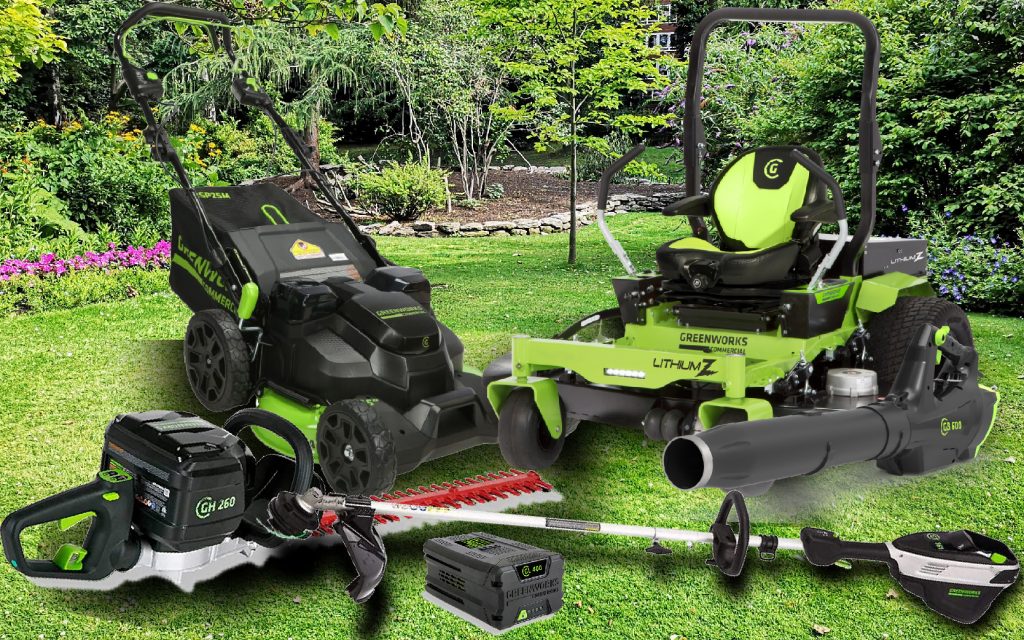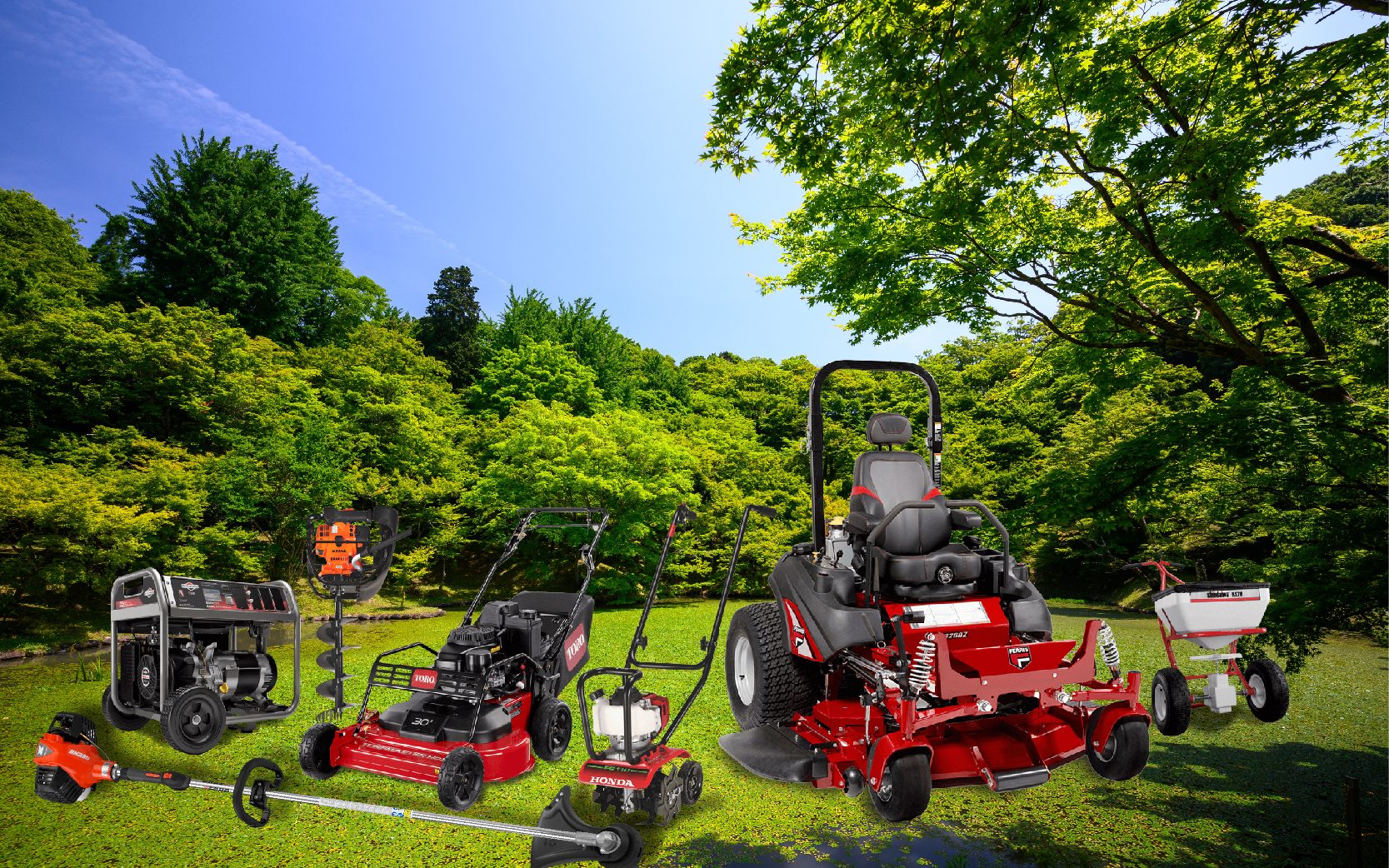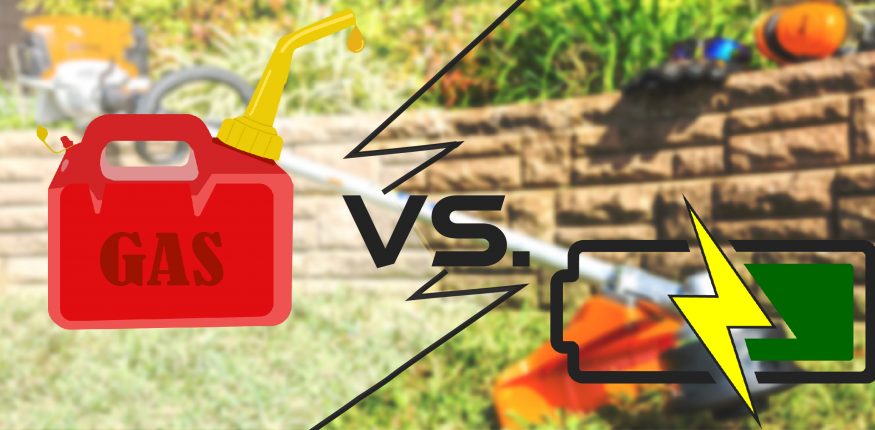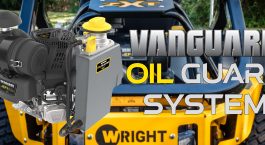Electric OPE may be Worth the Investment After All.
Pros and Cons of Electric Equipment

Battery-Powered Devices/Tools are everywhere. From smartphones to power tools and even cars, lithium batteries are taking over. The switch for Outdoor Power Equipment is coming much slower though. The upfront cost of electric equipment is often expensive and daunting; whereas, a gas machine of the same class can be bought at a much lower price-tag.
With traditional gas-powered machines, spring time is a mess. You have to dig out your equipment and hope that the sit time has not damaged any of the engine components or the pull chord. Granted that the machine is in working order, you have to spend time priming the engine and precious energy yanking on the pull chord for what seems like eternity only to find out that you never went to get gas for your equipment. Enter electric equipment. Eliminate the need to prime the engine and start the machine with the push of a button or flip of the switch.
Electric equipment refers to both plug-in and battery-operated. This article will focus mainly on battery-operated machines, but many of the pros and cons will overlap. As battery technology advances, is it worth it to buy electric equipment?
Pros
Generally Weigh Less
Does it really matter how much your equipment weighs? Maybe not, but lighter equipment will cause less fatigue and will be much easier on your body. If you plan on using the tools for a prolonged period of time, weight should be one of the factors on your mind. String Trimmers have some of the biggest gaps in weight. Many gas models weigh 2-4 pounds more than battery trimmers of the same class, even if they have no fuel in them! The weight of a Stihl FS 38 is 9.3lbs without fuel and the Stihl FSA 45 is only 5.1lbs with the battery. That’s over a four pound spread before gas is even added to the gas trimmer. Weight differences for a handheld blower are not generally as significant, but the battery-operated blowers still come in weighing less.
Beyond handheld equipment, mowers also weigh less. Mowers are designed more compact and with less components, so they weigh less and take up less space. This lends to a machine that is easier to maneuver and store. Furthermore, you wont need to lug around gas cans or have them taking up space in your shed/garage.
Produce Less Noise
Gas equipment is LOUD which can lead to grouchy neighbors and more seriously, hearing loss. If you have a lot of neighbors nearby and like to mow your lawn earlier in the morning (as recommended in our Mowing Article) or later in the evening, noise levels could be important to you (or maybe you’re just tired of earplugs). Electric machines make little noise while in operation and no noise when ‘idle.’ Even an electric blower is quieter than its gas powered equivalent!
Require Less Maintenance
Without a gas engine, many of the common repairs become obsolete. No more spark plugs, oil, oil filters, air filters, or other engine components to replace. If you want equipment that you can store and start up with no issues with minimal maintenance then you should look into electric equipment. Gas machines require regular maintenance that many people overlook which reduces the lifetime of said machine.
In addition to engine components, you will save money on fuel. As electric equipment runs off a battery/plug, you will be saving a ton on fuel costs. You can stop smelling exhaust and start enjoying the smell of fresh cut grass before the mowing is even done. Plus, since the equipment doesn’t use fuel, it can easily be stored inside your home. With most of the equipment being more compact, it can easily sit inside your extra closet or even underneath your bed!
Cons
Shorter Run Times
Even with advancements in technology, battery-operated equipment still only has a run time of 30 minutes to an hour. This works great for a small yard, but a larger yard will require multiple batteries or a good bit of down time to recharge the battery. Even if a gas-powered machines runs out of gas, it only takes moments to refuel, but with battery-powered machines, there is no quick refuel (unless you purchase multiple batteries). In addition, it can be easy to forget to remove the battery and put it on the charger at first which would lead to an even shorter run time.
Higher Upfront Cost
Although electric equipment generally costs less over the life of the equipment, the upfront cost is generally higher. Gas-powered mowers that have better power can be $200-$300 cheaper up front. Moreover, lithium batteries are still quite pricey, so when it comes time to replace the battery (or if you want an extra) it could cost you another few hundred dollars. However, the battery cost can be balanced out, as you buy more tools. Generally, the same battery can be used across a lineup of equipment from the same manufacturer. If you buy all Greenworks Commercial Handhelds, the same battery can generally be used for all of them.
Lower Maximum Power
The biggest issue for most is the power (or lack there of). While battery-powered equipment will be able to tackle most household jobs, it sometimes lacks the power needed for a more professional or commercial use. Even the most powerful battery-operated machines only compare to mid-level gas-powered equipment. If you are only looking to trim some hedges, cut up small limbs and firewood, and trim grass, then electric equipment will perform just as well as gas equipment. If however you plan to fell large trees or cut through dense weeds and brush, you would probably be better off getting gas-powered equipment.
As far as mowers go, power is not really all that important if you cut your lawn regularly. As long as you keep your blades sharp, you should not see much difference between a gas and electric mower. The price is really the only pain point of an electric mower.
Pros and Cons of Gas Equipment

Gas-Powered Equipment has been the gold-standard for a long time. With equipment that fits every budget and need, you really cannot go wrong with gas equipment. From a small yard to a hundred acres, gas machines can get the job done. Known for being more powerful and having a better run time, gas machines are the choice for most homeowners and landscape professionals alike. With proper maintenance a gas-powered machine can last a lifetime (or close to it) and deliver the power you need for any and every job.
Pros
Longer Run Times
Gas-Powered Equipment can run as long as you keep putting gas into it. A single tank of gas can generally get through through an entire 8-hour workday or a couple weeks if you are only mowing/trimming at your home. Plus even once you run out of gas, it takes no time at all to refuel. this gives gas-powered a big edge for larger areas/projects. If you plan on cutting down multiple trees or mowing a 5 acre lawn, gas-powered equipment is likely your better choice.
Cheaper Upfront Cost with More Options
With how long gas equipment has been around, there are plenty of options that fit virtually any budget. Equipment costs range from under a hundred dollars to multiple thousand, but they are almost always cheaper than electric equipment of the same class. The lifetime cost of the equipment will likely be higher, but that is not always the case.
More Power for Tougher Jobs
For jobs outside of routine maintenance, a gas engine will likely be needed. While there won’t be much of a difference for routine activities such as trimming around the garden and mowing the lawn, you will see a huge difference when clearing thick brush or mowing down overgrown fields. Gas engines have had decades of development to get maximum power output while still being affordable.
Cons
Costly Maintenance
Gas equipment needs regular maintenance that many owner neglect which leads to very costly repairs. Even the regular maintenance can become expensive over time. Most OPE should be run with ethanol-free fuel to increase the lifespan of the equipment. Outside of a more expensive fuel, gas engines require air filters, spark plugs, carburetors and a ton of other parts. If you cannot diagnose your machine and replace these on your own service shops are very expensive. Even if you do have the knowledge needed to fix the equipment, the parts can get pricey.
Emissions
Gas OPE produces a ton of emissions. In fact, running a lawn mower for an hour emits the same amount of pollution as a car being driven for 200 miles. Emissions are terrible for the environment and beyond that gas is expensive! With gas prices rising, having non-efficient equipment can end up costing you a ton.
Bulky and Heavy
Gas equipment weighs significantly more than electric equipment and takes up way more space. Furthermore, gas equipment requires a separate storage space for the gas cans as well as the equipment. Everything has be kept separate from your living space which isn’t possible for everyone. In addition, those gas cans can leak in your car causing even more issues.
Final Thoughts

The type of equipment you buy relies on many factors but this is our general recommendation. If you have enough money upfront (or have the option to finance) and are looking for lightweight, easy-to-maintain equipment to tackle routine maintenance, electric equipment is most likely the way to go. You won’t have to spend time maintaining your equipment and it will start up easily even after sitting for a few months. Furthermore, it is quieter and better for the environment. Electric equipment also make for a great back up to your gas-powered machines. If you run a small lawn care business, consider buying an electric trimmer and blower in case your gas-powered ones need maintenance. You’ll be able to help clients you wouldn’t be able to otherwise.
For the lawn care professional that only has a few clients or those looking to tackle tougher jobs, you should probably go with gas-powered equipment. It will run for a longer time and give you more power when you need it. Also, if you can’t afford to buy electric equipment, gas-powered equipment has a lower price tag.
If you are a professional looking to take one a ton of jobs or you just make enough to buy some extra equipment, we would recommended buying a mixture of gas-powered and battery-operated equipment. Running battery-operated equipment for the routine jobs will save you money and save your body from some of the workout, but you will still need your gas equipment for the tougher jobs. In addition, the electric equipment can come in handy if your gas-powered equipment fails or needs maintenance.
FURTHER READING:



